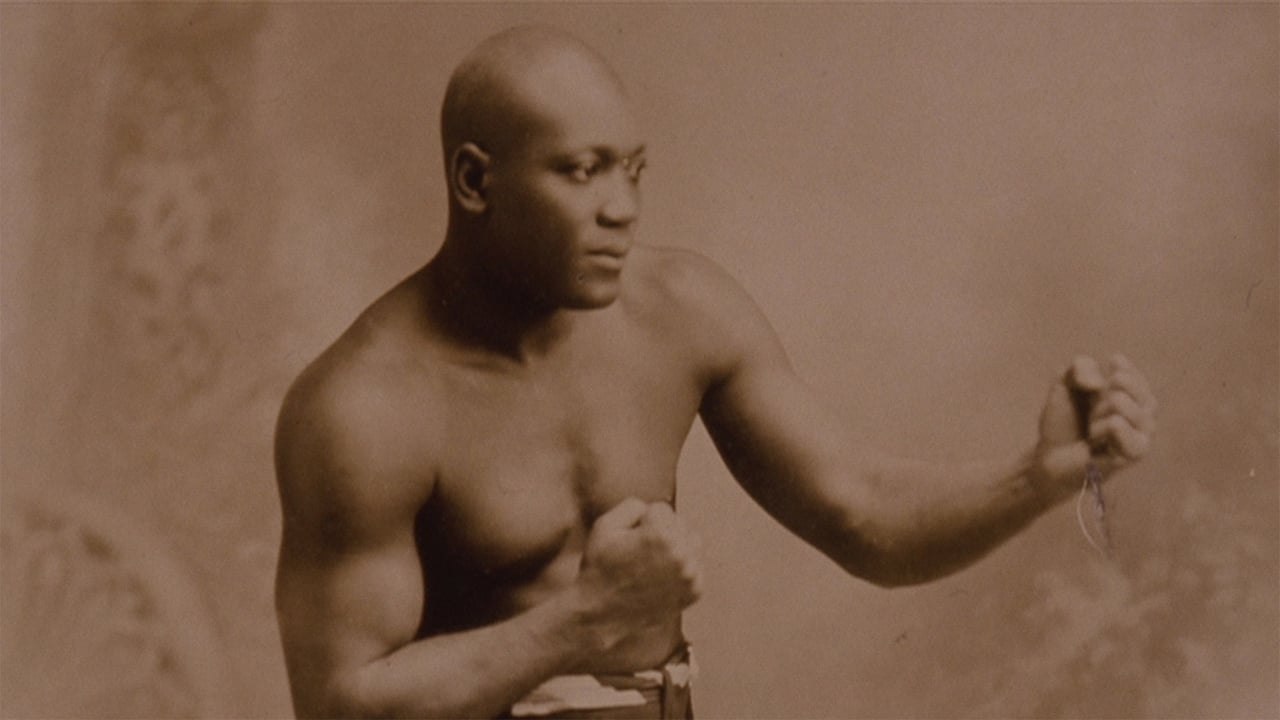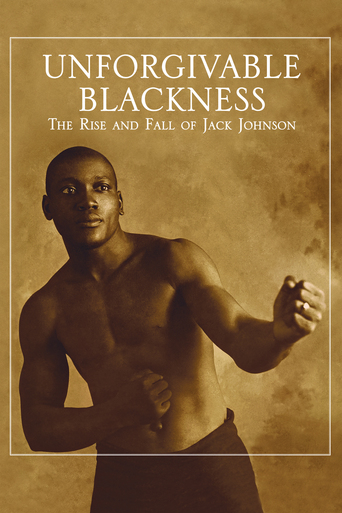

The one thing that did surprise me about this otherwise impressive documentary that Ken Burns put together about Jack Johnson was that he did not use some archival recordings of Jack Johnson and for that matter Jess Willard's voice. Both are available, in fact on one of my vinyl LPs I have them. In the case of Johnson, Samuel L. Jackson captured both his voice and inflections of attitude quite well.When Joe Louis became heavyweight champion it was as much a milestone for racial equality as Jackie Robinson integrating professional baseball. Louis was a man conscious of what this country was around him as was Robinson and sought to become a hero to all. When he knocked out Max Schmeling in that second fight he did just that.Jack Johnson was a man born in a much harder and crueler time when black Americans may have been freed from slavery, but not from the attitudes that engendered it. He was the best at his sport, he knew it and he made sure everyone else knew it. It was only in 1967 that miscegenation laws were finally done away with by the Supreme Court, but in the years Johnson was in his boxing prime they were enforced with a vengeance. It galled a large section of white America that saw him keep public company with white women and even more that he beat just about every challenger black and white thrown at him.Looking at the Johnson-Jeffries fight of 1910 to me it's almost unfathomable that people could have invested so much in Jeffries in their racist hopes. Jim Jeffries licked all before him when he retired in 1905 undefeated in the ring. Probably had he taken on Johnson and such other black contenders like Sam Langford, Joe Jeanette, and Sam McVey he might well have beaten them. But the Jeffries who had been out of the ring for almost six years was never going to take on Jack Johnson in his prime. If anyone bothered to filter through all the racial crap and examined the situation logically no one would have bet on Jeffries.James J. Corbett another former champion who Jeffries beat twice in comeback attempts and who worked to train Jeffries for the bout was accused of racism. Probably so, he like many tossed a lot of racial epithets to get Johnson to lose his cool in the ring, but Burns mentions that Tom Corbett, Jim's brother was the chief bookie for bets on the fight in Reno. There was barely any money bet on Johnson, so the Corbett family may have had racial sympathies with Jeffries, but they would have cleaned up on all the money bet on Jeffries with them.When Johnson did lose to Jess Willard in 105 degree heat in Havana in 1915, he was passed his prime also and the years of high living cost him, probably put him passed his prime a lot sooner than he would have gotten there. Still seven years is a long time to be a boxing champion in any division. I remember as a kid when film of the Willard-Johnson fight were discovered, having thought to have been lost for years, Jess Willard was still alive and somewhat vindicated that he in fact won a clear victory despite all the rumors that Johnson had thrown the fight. It was 26 rounds in that tropical heat and Willard just outlasted Johnson, the same Johnson outlasted an over the hill Jim Jeffries.Why the heavyweight division was so racially sacrosanct was still a mystery. Joe Gans and Lampblack Joe Walcott were lightweight and welterweight champions at the time Johnson was champion and while life was no bed of roses for either of them, they never encountered the animosity that Johnson faced. He did in fact not fight those boxers I mentioned before when he won his title. The white champions didn't fight for racial reasons, but Johnson wouldn't fight them because they wouldn't draw any kind of gate. Sad, but he was right on the economics.It was also mentioned that he wanted to fight Jack Dempsey in the Twenties. Quite frankly if he couldn't take Willard, he would have been slaughtered by Dempsey in his prime. But Dempsey also refused to fight a great black heavyweight named Harry Wills who was left begging for a title shot and Wills would have been a match. The first black on black heavyweight title fight was when Joe Louis fought John Henry Lewis for the title in the late Thirties.Jack Johnson was a man out of his time as much as Joe Louis was a man of his. When Muhammed Ali came to the fore a lot of boxing fans and historians were taking a second look at Johnson and giving him is long overdue due. A lot of people say he was the greatest heavyweight champion of all time and one can make a great case for it.Which is what Ken Burns did in this extraordinary documentary.
... View MoreAs a youngster I heard about this man Jack Johnson. Even then I thought those same stories were fiction. Afterall, no one could convince me that, in the early 1900's a black, Negro, could have possibly conducted his life in such a way to disdain social mores not only to the degree in and of itself, but more so in his audacity.Marrying and dating white women?? Come on. And he did not get killed? It shows that even for those times, America had this certain elasticity in dealing with a unique personality such as Johnson's.This movie weaves his life thoughtfully, slowly (a 2 disc set after all) and with dignity. The voices that contributed to this story is so widely varied that I implore you to check the movie's credits. From Ed Harris, Kevin Conway, Samuel L. Jackson and the lead narrator, Keith David. But these voices aren't the complete range of contributors. For this kind of talent to come together is a testament to the power of the story and the pull that director Ken Burns commands.Unforgivable Blackness ... is a powerful, thought provoking part of the American Experience. To that end, PBS deserves continued credit for bringing history to the masses.Humbly Submitted and with deep emotions, Ron W.
... View MoreWhat a perfect documentary. What a master Ken Burns is. Unforgivable is the story of the indestructible Jack Johnson, the first black heavyweight boxing champion, whose legendary style downed even the toughest white contenders inside the ring, and sent almost every white American into a frenzy of racial contempt for him, outside the ring.Jack Johnson is such a rich subject; it seems we could never tire of him. He was the rags to riches American dream. He was the champ who repulsed an entire generation of whites - refuting their fundamental belief that blacks were by nature inferior beings. He was the pioneer that paved the way for future black athletes, who had formerly been relegated to Negro leagues. And he was the social trailblazer as well, integrating with whites in unprecedented and often dangerous ways. Now Burns has reconstructed his life in and outside the ring through this wonderful collection of photos, interviews, film reels and archival documents. In short, I've seen no other documentary that so pungently depicts the black struggle to be accepted, and indeed, free in America.
... View MoreI saw this film at the 2004 Toronto International Film Festival. It may seem hard to believe, but I've never seen a Ken Burns film. I've always meant to, of course, but watching a multi- part documentary series is something of a commitment. So I jumped at the chance to see an entire film in one sitting. Clocking in at an impressive 218 minutes (and including a short intermission and a lively Q&A session, I was in the theatre for almost 4½ hours), I was hoping that the quantity would be matched by the quality. I was not disappointed.Jack Johnson was a true original. The first black man to hold the heavyweight boxing championship, he was a self-assured man who dressed well, drove fast cars, and kept white women as girlfriends. While not unusual now, this was highly irregular a hundred years ago, at a time when black lynchings were at their peak and the press regularly printed offensive cartoons to go along with its racist rhetoric. In the ring, he was a highly intelligent boxer, favouring a defensive style unknown in his day. He was also incredibly sensitive and articulate, especially for a man with only five years of formal education. But the struggles Johnson faced were almost insurmountable. No white champion would agree to fight a black man. Jim Jeffries preferred to retire undefeated rather than face Johnson, and Johnson had to travel around chasing champ Tommy Burns, hounding him to give him a title shot. When Burns finally agreed to a fight in 1908 (for a purse of $35,000, an unbelievable sum in those days), the contest wasn't even close, with Johnson dancing around, taunting his opponent, and talking to people in the ringside seats. The police stepped in during the fourteenth round to prevent him from knocking out the badly beaten Burns.Johnson held the title from 1908 until 1915, with his most famous bout in 1910, against ex- champ Jeffries, whom he soundly defeated. This led to race riots all over the country, and many people were killed. From the moment he won the championship, it seemed that white society looked for ways to discredit him. The press were relentless, printing hostile editorials and calling for a "Great White Hope" who would return boxing's crown to its rightful place (and race). When a 37-year old Johnson finally lost the championship to Jess Willard, a giant man ten years his junior, it seemed to many that the black race had been taught an important lesson.Johnson's life was troubled, and he continued to face persecution from the press and even law enforcement, who prosecuted him on charges related to his "debauchery" with white women. He eventually served a year in prison. There would not be another black heavyweight champion until Joe Louis, 22 years later.This is a remarkable film for many reasons. First of all, in the little-known story of Jack Johnson, Burns has found a microcosm of the racial situation of the day, and one that has many echoes even now. Muhammad Ali, after seeing James Earl Jones portray Johnson in the Broadway play "The Great White Hope" (later made into a film), declared that Johnson's life story was similar to his own. A black man choosing to live as a free individual on his own terms is something that is still hard for some white people to tolerate.Burns' film is also remarkable for the way in which it uses actual archival film of Johnson's bouts. Using silent film, Burns and his crew have added sound effects such as crowd noise and the sounds of blows connecting, and it gives these scenes the visceral punch they require. Finally, the superb "talking heads" (including the late George Plimpton, James Earl Jones, and the witty Stanley Crouch) and voice talent (Samuel L. Jackson is the voice of Johnson; others include Billy Bob Thornton, Derek Jacobi, Brian Cox, and Alan Rickman) bring the extraordinary story of Jack Johnson vividly to life.As an added bonus, you get to hear James Earl Jones say "balls". Twice.(9/10)
... View More